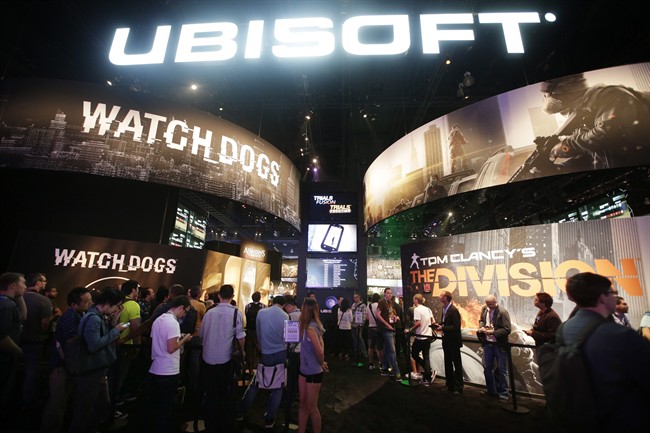TORONTO — Ubisoft hopes to take gamers from Paris, on the eve of the French Revolution, to the modern-day fictional Himalayan region of Kyrat this holiday season.

With the release of “Assassin’s Creed Unity” on Nov. 11 and “Far Cry 4” on Nov. 18, two of Ubisoft’s showcase made-in-Canada video game franchises will be front and centre in stores. They are journeys that look to entertain while swelling the Ubisoft bottom line.
Ubisoft Montreal was the lead on both titles, with help from sister studios in Toronto and Quebec City as well as others around the world.
It’s a time to savour for Yannis Mallat, CEO of Ubisoft Montreal and Toronto.
“There’s always pride when you release a game. But I have to say that this year we’re pretty proud because I can’t think of any other studio that is releasing two big triple-A next-gen games seven days apart,” Mallat said in a recent interview.
“And if you think about a 12-month span, you have ‘(Assassin’s Creed) Black Flag,’ ‘Watch Dogs,’ ‘Far Cry 4,’ ‘Chlld of Light,’ and ‘Shape Up.’ That’s six games (with ‘Assassin’s Creed: Unity’) coming from our Canadian studios in a year, four of them big next-gen triple-A games. So yes, it feels great.”
The “Assassin’s Creed” franchise has already sold 78 million copies, with “Far Cry” at 20 million. “Watch Dogs,” a new franchise, has sold nine million already.
Mallat, 40, takes pride in the immersive world of his studios’ games, with Paris in the late 18th century the star of the new “Assassin’s Creed” game.
- Budget 2024 failed to spark ‘political reboot’ for Liberals, polling suggests
- Train goes up in flames while rolling through London, Ont. Here’s what we know
- Peel police chief met Sri Lankan officer a court says ‘participated’ in torture
- Wrong remains sent to ‘exhausted’ Canadian family after death on Cuba vacation
“When you spend half an hour in Notre-Dame (Cathedral), with all the astonishing details, it is indeed a blast,” Mallat said.
“The level of reality is absolutely insane,” he added.
A native of Nantes, France, Mallat spent three years as a teenager in the Ivory Coast, where his diplomat mother was stationed. He returned to Paris to study agronomy (the science of soil management and crop production) before travelling to the Ivory Coast and then Burkina Faso to do humanitarian work.
He moved to Quebec City in 1997, to work at the University of Laval on development projects. Combining his desire to change careers and his passion for video games, he went back to school to earn an MBA at HEC Montreal that ultimately opened the door to Ubisoft in 1999.
He started as a third-party producer, taking over as CEO of Ubisoft Montreal in 2006 at the age of 32. In 2009, Mallat added a new Toronto studio under his umbrella.
Ubisoft opened its Montreal studio in 1997 with 50 employees. There were 400 employees when Mallat first came on board and 1,400 when he took over as CEO. Today that number has swelled to 2,700, with plans to reach 3,000 next year.
Mallat speaks of his flagship studio with great pride.
“When you give a talented team time, means, insane objectives and trust, usually they come back with greatness,” he said.
The Toronto studio (340 employees) is slated to reach 800 in 2020 while there are another 500 at Ubisoft Quebec.
They may just be games but there is much at stake.
Ubisoft reported worldwide sales of 484.2 million euros (C$684 million) for the six months ending Sept. 30, up from 293.3 euros (C$414 million) over the same period a year before.
And Ubisoft expects sales to reach 730 million euros (C$1.03 billion) in the lucrative current holiday quarter, up 40 per cent from last year.
Hit titles, digital downloadable content and a flourishing back catalogue have helped drive revenue.
Amidst all the numbers, Mallat looks for more human values. He understands that gamers give up time as well as money in playing Ubisoft titles and that it is not worth abusing that trust with add-on content that doesn’t make sense.
And with time tight, Mallat says gamers want an accessible and entertaining experience.
“We want to be the king of the living room and we will,” he said.
There is no shortage of feedback.
“Gamers are very vocal, very vocal,” he said. “Unfortunately the most vocal people are the most angry ones. But it’s a gift for us because when those gamers react to the game that we just released, it gives us a clear list of what to do with the next opus.”
With 29 studios in 19 countries, Ubisoft games are a collaboration between the lead studio and others around the globe. Trust and communication have proved to be key in making the partnerships work.
Mallat remembers “Assassin’s Creed 2,” when the Montreal studio was working with a new outfit in Singapore. There were no real ties between the two at the time and confidence in the new studio was lacking. Then one of the Montreal team members moved to Singapore.
“Having that guy there suddenly erased the confidence issue,” recalled Mallat, snapping his fingers.
“Assassin’s Creed Unity” is available on Xbox One, PlayStation 4 and Windows PC while “Far Cry 4” is available for PlayStation 3 and 4, Xbox 360 and One, and Windows PC. Both are rated M for Mature.


Comments